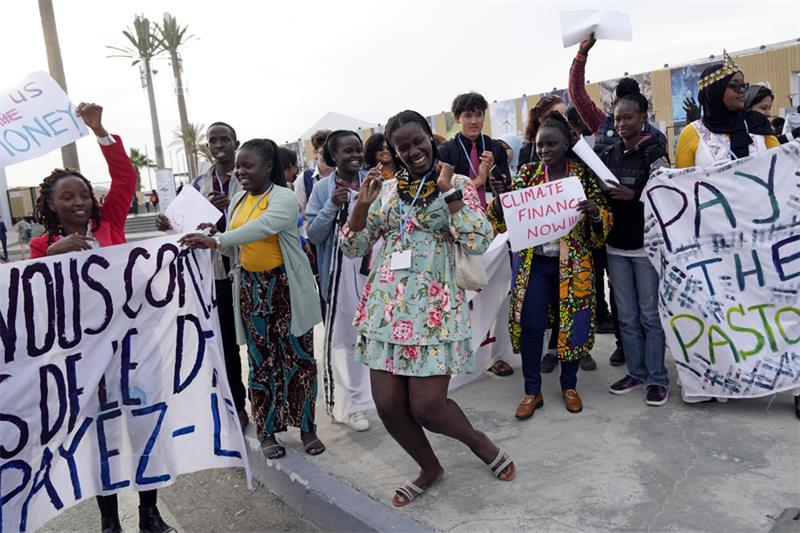
Demonstrators participate in a protest at the COP27 U.N. Climate Summit, Thursday, Nov. 17, 2022, in Sharm el-Sheikh, Egypt. AP
In a statement on Thursday, the Pan-African Climate Justice Alliance (PACJA) – a consortium of more than 1,000 organisations from 48 African countries – urged world leaders to adopt actions that reflect the scale and urgency of the climate crisis.
The PACJA added that Africans participated in the COP27 talks with the hope that "concrete" outcomes on climate issues – including Loss and Damage – be materialized.
The PACJA's statement said that millions of Africans would be left in continued climate-related misery if the international community failed to meet their commitments and pledges.
“We came with the hope that the momentum created by the discussions in the year ahead of COP27 under the facilitation of UNFCCC, the COP Presidency and the facilitation of friends of the COP will materialize with concrete outcomes in Egypt. But unfortunately, the end of COP is an anti-climax,” said Mithika Mwenda, the Executive director of PACJA.
Mithika added that the people who face starvation in the Eastern and Horn of Africa because of climate-related droughts, and the women who drown in the floods in Nigeria and those who are buttered by the cyclones in Southern Africa will all continue to wait for signals on action from the international community.
“This will continue to delay because decisions on Loss and Damage have been delayed yet again to 2024,” he said.
Augustine Njamnshi, Chair of Political and Technical Committee of PACJA, noted that Africans are less reassured of the goodwill of global leaders, especially those in high-polluting industrialized countries.
He added that climate activists expected to see delegations from the developed countries make bold decisions that reflected the scale and urgency of the climate crisis.
The deferral of a decision on financing Loss and Damage to 2024 with no guarantees of an outcome that reflects the aspirations of Africa, and the lower-than-needed emission reduction ambition announced by big polluters, particularly the EU, have downgraded the COP in the eyes of the Africans, said Njamnshi.
He added that the lack of a clear trajectory for phasing out fossil fuels, which has resulted in the decisions by some countries to continue using high polluting fossil fuels that has powered the same economic model behind the current climate crisis, would not be helpful.
“After a careful examination of what needs to change to rekindle hope and justify Africa’s continued engagement with the global effort to address the climate crisis, we call on African leaders to reassess the relevance of the UNFCCC and COP processes to the African people and take radical actions to strengthen Africa’s voice and participation,” said Njamnshi.
He demanded big polluters to honour their engagement to deliver the resources needed to address the climate crisis in Africa, especially in the areas of adaptation and Loss and Damage.
Florence Kasule, a climate activist from Uganda, said women feel disappointed by the lack of action on adaptation and on Loss and Damage. Such lack of action, she said, will have its ramifications on agriculture upon which the economies of African countries rely and on which the livelihoods of women, who drive agriculture, depend.
However, the Loss and Damage Collaboration – a global coalition of activists, researchers and decision makers – tweeted on Tuesday night that a text on the institutional arrangements to provide technical assistance to countries and communities impacted by Loss and Damage has been agreed on by all Parties at COP27.
UN and COP27 presidency's efforts on Loss and Damage
Earlier this week, the United Nations released a draft text setting out two prospective proposals that could pave the way before COP27 participants to reach an agreement on Loss and Damage financing for impacted countries.
The first proposal says COP27 would establish a Loss and Damage fund by late 2024, while the second proposes two years of technical work to explore whether the issue should be addressed through a broader “mosaic” of funding arrangements, according to news wires.
While the first proposal has been widely supported by several developing countries, including small island states and emerging economies, it seems to be hardly acceptable by affluent nations.
On Tuesday, COP27 president Sameh Shoukry told Bloomberg TV that he is optimistic that a “satisfactory” deal on loss and damage can be reached, adding that he would work toward reaching a “definitive landing zone” on the newly placed item on the COP's agenda that would be "satisfactory" to all parties.
Shoukry, however, reiterated that responding fairly and equitably to the challenging issue is certainly the responsibility of the parties, saying “my responsibility is to facilitate the environment to address various perspectives and maybe also suggest some formulas that might meet with their approval.”
“I’m not prejudging the process. I’m only assessing the importance of the issue and that it should be dealt with sufficiently and to the satisfaction for all parties,” Shoukry noted.
Short link: